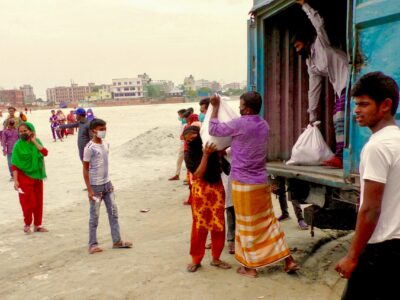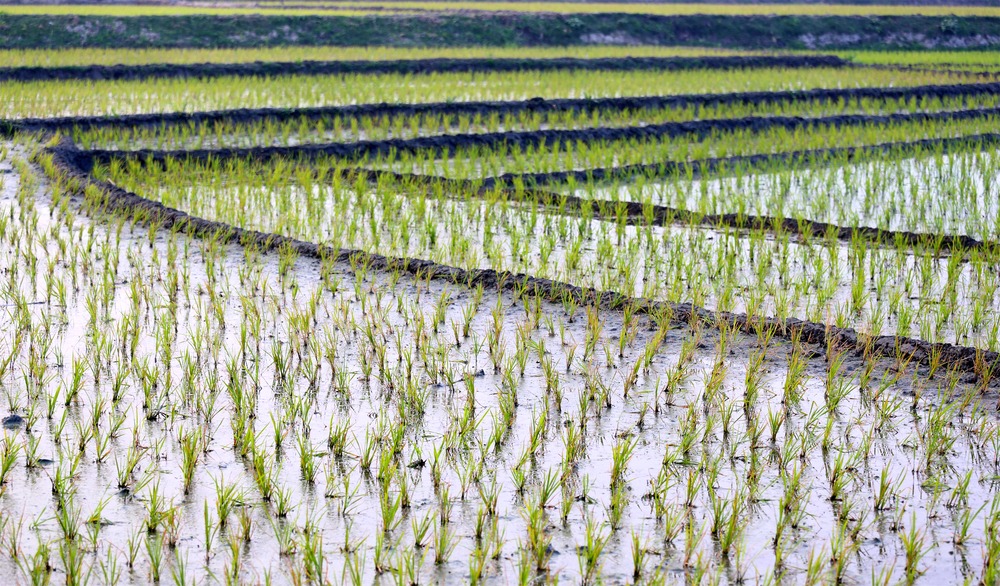
Final Report
Access the Feed the Future Bangladesh Rice and Diversified Crops Activity Annual Progress and Final Performance Report, published December 2021.
Gender Study Impact Report
Access the Feed the Future Bangladesh Rice and Diversified Crops Activity Gender Study Impact Report, published December 2021.
Annual Program Statement
Access the document here.
Fact Sheet
Access the Feed the Future Bangladesh Rice and Diversified Crops Activity Fact Sheet, published June 2021.
Interactive Report on Agent Banking
Access the interactive “Agent Banks Advance Community Resiliency During COVID-19 in Bangladesh,” published November 2021.
Outcome Harvest: Influencing Systemic Changes in Agricultural Market Systems in Southwest Bangladesh
Access the full report here, published January 2022.
Business Accelerator Model Write-Up, Agrilinks
Access “Struggles and Successes of Testing a Business Accelerator Model for Women in Bangladesh’s Agricultural Market,” by Bidowra Khan and Nathalie Me-Nsope, published by Agrilinks July 2022 here.
Summary
The USAID-funded Feed the Future (FTF) Bangladesh Rice and Diversified Crops (RDC) Activity increased incomes and improved food security and nutrition in 21 south western Bangladeshi districts included in the FTF Zone of Influence (ZOI) through systemic market changes that promoted a diversified farming system based on intensified rice production and the introduction of higher-value, nutrient-rich crops. Rice intensification allowed farming households to secure greater quantities of affordable rice, transition to profitable and diversified rice-based cropping patterns, as well as generate off-farm income opportunities. These outcomes positively impacted food security by increasing and diversifying incomes, improving availability and access to nutrient-rich crops, and improving resilience to economic shocks such as COVID-19 and natural disasters such as cyclone Amphan. RDC exceeded its goals through facilitative interventions and market actor partnerships that created scalable market systems, enterprise, and household impacts, ultimately benefiting rural households and expanding opportunities for women and youth.
Objectives
- Increase farm productivity through improving access to productive inputs, such as more suitable and higher-value seeds, bio remedies, crop protection products, access to finance and mechanized services, and crop and production advisory services.
- Increase participation in profitable market systems through the introduction of market-suited crop varieties, crop take-off agreements, seed contract farming, processing linkages, integrated services (e.g. input supply, mechanized services and buy-back guarantees), as well as linkages to urban markets.
Activities and Approaches
- Domestic and international research on appropriate crop varieties, services, and other inputs with a view to sharing best practices with market actors and making the inclusive business case for firms to invest in the integration of women and youth into business operations.
- Targeted technical assistance to groups of firms on specific aspects impacting the market systems that could catalyze systemic change to enhance efficiency, effectiveness, and scale of impact.
- Provision of cost sharing grants in order to buy down risk for firms establishing, expanding, or improving distribution and/or procurement models to include more underserved market actors in the Feed the Future zone, scaling new input service delivery models, and/or increasing access to financial and mechanized services in rural areas.
- Leveraging learning, knowledge and linkages obtained from the implementation of the Activity to guide and enhance firms enagagement with farmers and expand firm level service offering
Anticipated/Achieved Project Results
- 1,074,811 beneficiaries reached by RDC — a 215 percent achievement over the targeted 500,000 beneficiaries.
- $378 million of new income generated from the USG investment (farmers earned an additional $348.68 million from grain sales and private companies earned an additional $30.61 million)
- $3.4 million leveraged in match funding from the private sector (over $90 million in-kind and financial services leveraged )
- Reduced access outreach from $28 to $3 per farmer over the life of award (LOA)
- Increased average farmers incomes from $9 to $107 over the LOA
- 1,340,034 MT of commodities (Rice, Maize, Sesame, Mung bean, Sunflower, Lentil, Ground nut) sold by participating producers
- $348,678,262 earned from grain sales by farmers.
- Worked with 43 companies to provide high-quality inputs, services, markets and access to finance for 1,074,811 farmers.
Partner Assessment Tools
market Actor Partnership Agreement Gender Review checklist
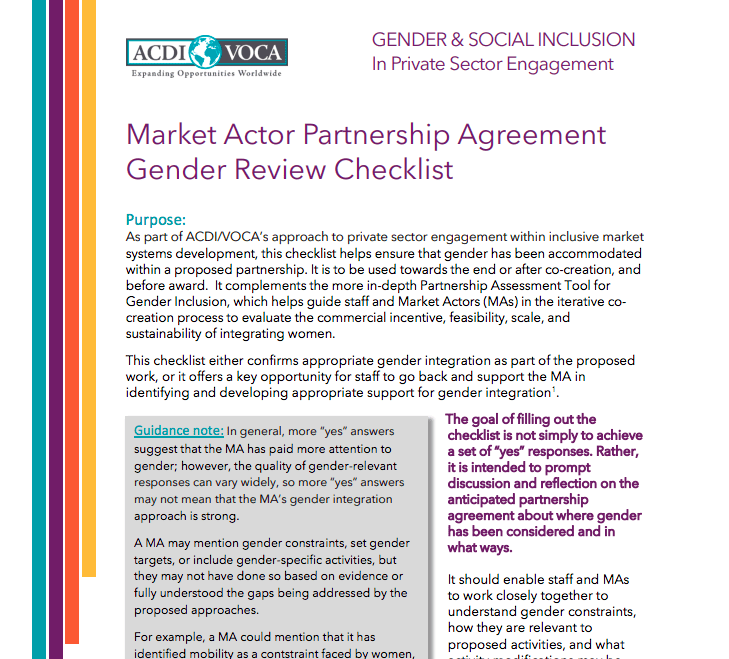
tool for assessing motivations of private sector partners to work with women as suppliers, employees, and consumers
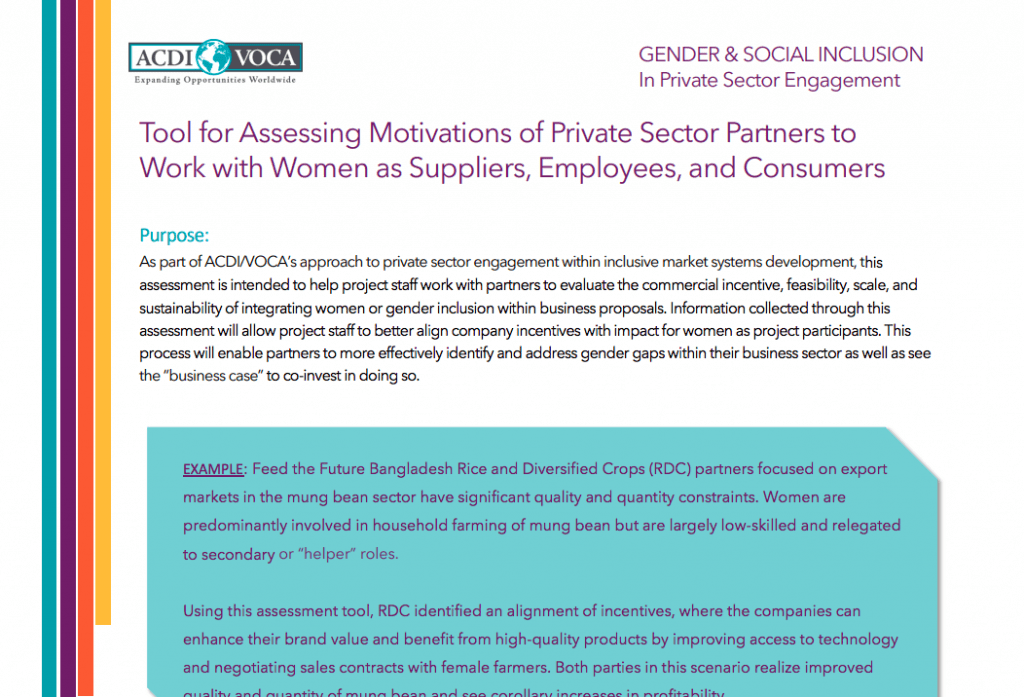
Funder: USAID
Chief of Party: Cuan Opperman, copperman@acdivoca.org

Project Director: Mike Thayer, mthayer@acdivoca.org

Project Specialist: Ayo Egunyomi, aegunyomi@acdivoca.org
related news
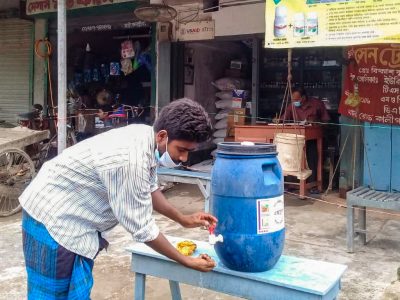
Supporting Farmers’ Access to Inputs in Bangladesh During COVID-19
One of the many damaging side effects of the COVID-19 pandemic in Bangladesh was a blocking of critical agricultural inputs, …
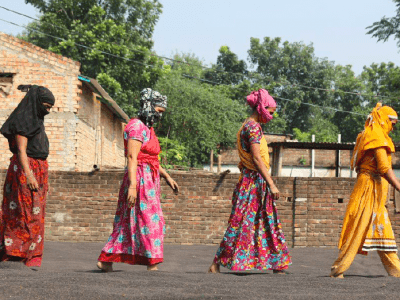
Outcome Harvest: Influencing Systemic Changes in Agricultural Market Systems in Southwest Bangladesh
Using Outcome Harvesting to Detect and Describe Systemic Change in Bangladesh Overview The recently completed USAID-funded Rice and Diversified Crops (RDC) …

